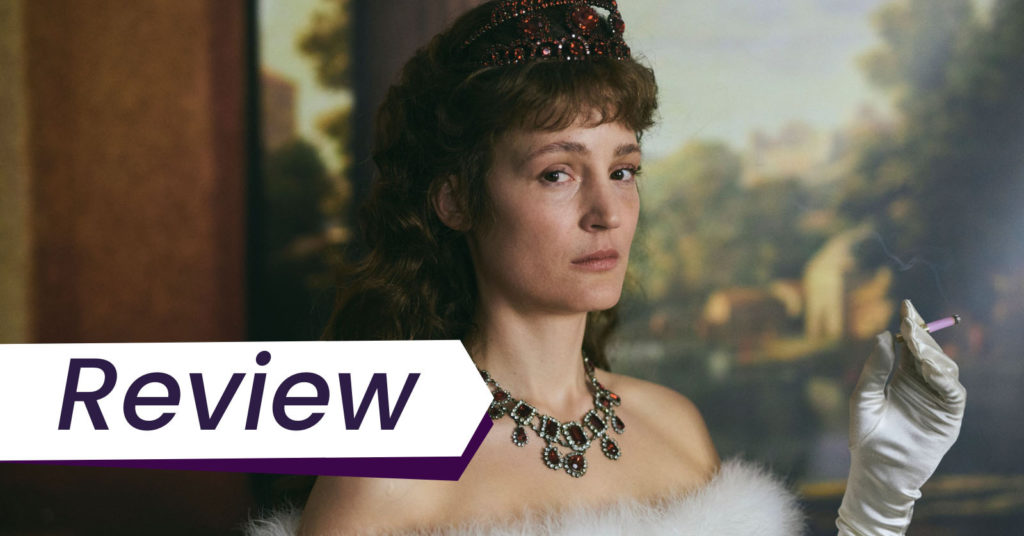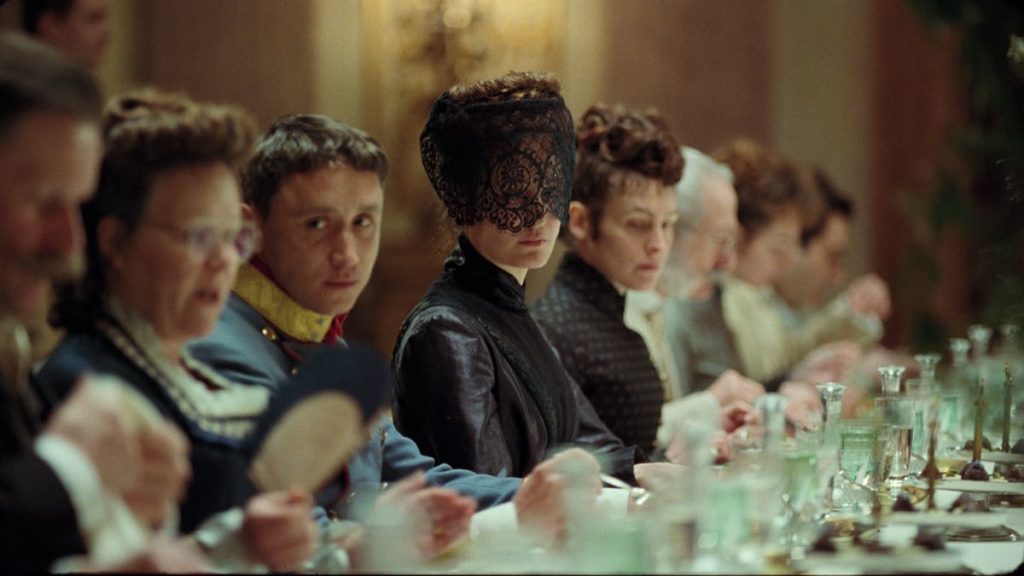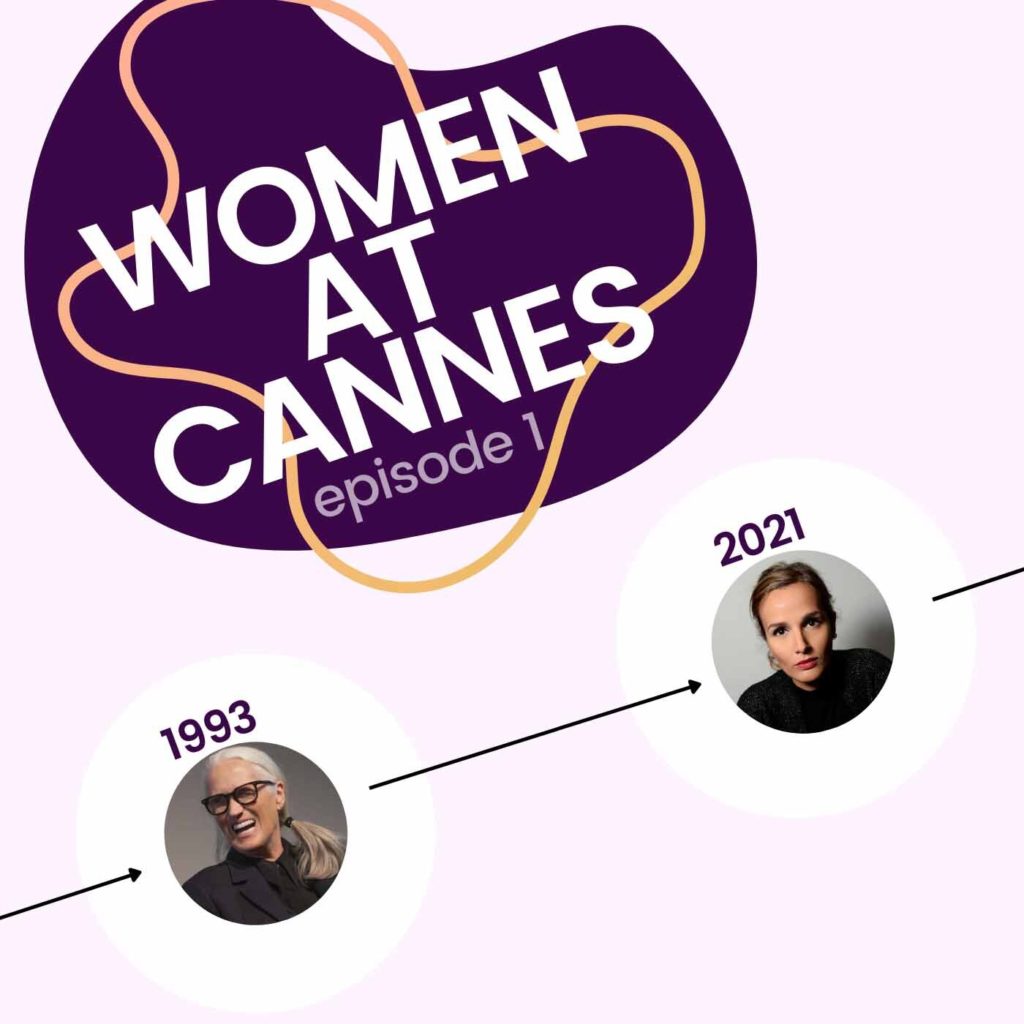Marie Kreutzer’s film Corsage, which premiered in the Un Certain Regard sidebar at the Cannes Film Festival, reframes the story of Empress Elisabeth of Austria (Sissi) as one of a woman trying to live up to impossible beauty standards in a patriarchal world.
Stay updated on films by women at Cannes 2022 and our current podcast season on Women at Cannes. Sign up for updates here.


Listen to the podcast season on Women at Cannes
Over the course of four episodes, we celebrate achievements of women directors at the Cannes Film Festival in Competition and beyond, both this year and in the past.
Discover one film you didn’t know you needed:
Not in the zeitgeist. Not pushed by streamers.
But still easy to find — and worth sitting with.
And a guide to help you do just that.
“Long may she live,” the dinner guests cheerfully sing in in Marie Kreutzer’s film Corsage. They are standing, raising a glass to celebrate the fortieth birthday of Empress Elisabeth of Austria (Vicky Krieps, who also impressed in last year’s Bergman Island). Elisabeth, who remains seated, trying and failing to smile isn’t so sure that living long would really be a gift. Set over the course of the year following her birthday, Corsage charts Elisabeth’s inability to reconcile with the fact that her age seems to be a death sentence, despite the fact that she’s alive and healthy.
The daily routine of maintaining her acceptable appearance is a chore. Even for an accomplished sportswoman, riding her horses, gymnastics, and fencing have become less about enjoyment than maintaining her figure. The increasing difficulty of this with age also means she’s lacing her corsets tighter and tighter — the red marks on her back from this practice are glimpsed only later in the film — and forgoing meal after meal. She understands that her duty is to, as she puts it, have her hair braided, to be the exemplar of beauty, but that’s getting harder to do by the day.
It’s also a constant performance. In Marie Kreutzer’s film Corsage, Elisabeth is rarely without an audience. Even at home, her ladies in waiting watch her exercise, weigh herself, and cry out in frustration. An early scene in the film finds her at a formal engagement in Vienna, and when someone says something passive aggressively unseemly, she faints. Having seen how tightly she laces her corsets, this could be taken as genuine, but in the next scene, she demonstrates good fainting technique to her close friend and confidante, King of Bavaria Ludwig II (Manuel Rubey). His attempts don’t meet her highly practiced standards. When her husband, Emperor Franz Joseph (Florian Teichtmeister), visits them that evening, the first thing he does is remove his fake beard and place it in an ornamental box for safe keeping. When Elisabeth tries to complain to her husband that she is tired of being there to, as he puts it, “represent,” he dismissively reminds her that she enjoyed the role for its beautiful frocks, back when she was effortlessly praised for her beauty. What he and the other men she encounters don’t see is the effort that goes into maintaining what perceived beauty remains.
Now, she’s become obsessed with her legacy and her image, and yet not totally sure what image she wants to leave behind. She looks at the painting of her late daughter who died too young and marvels at how the image lies, making her look happier than she is. She’s excited to meet a man with a movie camera, Louis Le Prince (Finnegan Oldfield), because being filmed is an opportunity to collaborate on her image. She’s especially excited to learn that it doesn’t capture sound, and we watch the black and white moving images of her captured as she screams — unheard by us or posterity — into the distance. She’s reassured that as long as she smiles, she can say what she wants. Even when she unhappily poses for a painter, she does so while smoking a cigarette — inappropriate for women at the time — and eventually grows both bored with the process and frustrated by the impossibility of him capturing her as she’d like to be seen; she decides to give him the older paintings of her to copy from, instead.

In Marie Kreutzer’s film Corsage, Elisabeth is in the midst of a bigger existential crisis. At forty, what is her purpose if she can’t even succeed at doing the one thing her husband chose her to do? In one informal dinner with her husband, sat at opposite ends of a long table in an empty room, in a wide to emphasize the distance between them, she tries to renew her involvement with politics; her husband consulted her and followed her advice when they were younger but refuses to even confide in her now. She wants to pass on her spirit for adventure to her young daughter, but a midnight horse ride only makes her daughter cranky, and then very ill. When Franz Joseph tries to chastise her about these choices, she reminds him that child-rearing is her purview and he never cared before. He retaliates by passive aggressively avoiding her, leaving her alone in their large, empty home with nary a companion.
Even when Elisabeth tries to find a new role for herself, escaping through travel to visit friends, she seems to need to be desired and admired for her beauty. Partly, she’s looking for companionship and doesn’t know of another way to ask for it. Partly, though, she can’t understand her identity without being the recipient of this constant praise. Louis Le Prince persuades her to let him film her merely by flattering her; when he leaves the room after praising her, Krieps blushes with joy, hiding her face behind her book.
As modern viewers, it’s tempting to assume that Elisabeth’s search for male attention is a search for sexual satisfaction, but that never seems to be the driving force. The only time we see her achieving any sexual pleasure is through masturbation after a scandalous, if private, encounter with her British riding instructor, Bay (Colin Morgan). Though there was always an affectionate flirtation between Elisabeth and Bay (Colin Morgan), it’s only once she hears of the widespread rumours of their involvement that she seeks him out in private, wearing trousers and an open undershirt on her corset. He only caresses her clothed thighs, but it’s a moment of sexual tension and tenderness that we haven’t seen her experience before.
Most of the time, sexual relations are a way for Elisabeth to reassure herself that her body has some tangible value. In the midst of an ongoing spat with her husband, he arrives in her bedchamber only for her to cast off her blankets to reveal herself nude. It’s an offering, but it’s a complicated one. He starts to undress, but she reminds him that she’s too old for another baby. A hand job will have to suffice. Even still, there’s no intimacy in the moment. He remains clothed. They sit at right angles from one another, not otherwise touching, and Kreutzer shoots them from afar in a wide. Later in the film, when visiting her friend Ludwig, with whom she’s always been touchy-feely, she tries to turn it sexual and is rebuffed. The thought that he does not desire her, even though it’s because he’s gay, makes her inconsolable. Ludwig understands this and tells her that she doesn’t even want him; what’s unsaid is that she just wants or needs to be wanted.
Ultimately, Kreutzer’s Elisabeth in the film Corsage is looking for an escape, and soon, death seems like the only option. Her repeated suicide attempts fail. She’s instead congratulated on her good luck for surviving. In a post-injury check up with her doctor, she looks miserable, and her expression in a stunning closeup stops him mid-sentence when he starts to intone, “as a forty-year-old woman…” Marie Kreutzer cleverly shoots Elisabeth’s quiet rebellion here, cutting from a shot of the doctor to a reverse shot of Elisabeth boldly and defiantly sticking her tongue out. Then, to a wide shot where we see she’s only doing it when he’s not looking. The rebellions get more obvious though. Even on her travels, she always adhered more or less to the rules of society. At one state dinner, she leaves early, her dinner untouched, her middle finger in the air. It’s the beginning of learning to give no fucks and to find a way to use to her advantage the fact that all that matters is her image.
From here in Kreutzer’s Corsage, her body language goes from occasionally casual (unexpectedly so, if increasingly the norm, in a period piece) to constantly casual and even slouched. She roams about the house in her housecoat, even taking meals in it. She slumps on the ground in repose. She cuddles in bed with her son, then Ludwig, then her maid, and even publicly gets into bed (clothed) with a wounded soldier at the hospital to share a cigarette. Judith Kaufmann’s cinematography also gets looser: more frequently handheld, more mobile shots. The biggest surprise is when Elisabeth suddenly eating heaps of chocolate lavenders, whipped cream, and cake, and forgoing the daily weigh-ins and brutal exercise routines. It’s as if she’s packing in a lifetime of enjoyment into a few months, but Marie Kreutzer only slyly and gradually reveals why. When Elisabeth decides to make her lady in waiting adhere to the same strict diet, exercising and corsetry that she had previously been following, it’s initially unclear if it’s a sadistic tactic or more strategic.
In Marie Kreutzer’s film Corsage, Krieps gives a tremendous performance of depth, intelligence, frustration, and occasional petulance. Though at thirty-eight, Krieps couldn’t even pass for a rich forty-year-old in the 1950s with the help of some dowdying-up makeup (subtly but effectively done by Maike Heinlein and Helene Lang), let alone a woman of forty in the 1880s. But that’s kind of the point. Not much has changed in how we treat women in the intervening century. The feeling of obligation of maintaining a certain feminine physique while also achieving all the other expectations of a modern woman was the focus of Marie Kreutzer’s previous film, The Ground Beneath My Feet.
Corsage explores the same themes as Kreutzer’s earlier film but in a period setting, yet one that’s designed to feel not too distant: the soundtrack from Camille — first heard over a slow-motion shot of Elisabeth followed by her entourage — and Krieps’s modern body language (constricted only by her clothing) are meant to remind us that this is a modern reinterpretation of events. By the end, Marie Kreutzer has taken great but rewarding liberties with the story of a woman who has been a frequent subject of biopics (The Sissi trilogy being the most famous), but whose inner turmoil has never taken centre stage until now.
From films and TV about Elizabeth I to The Crown or ITV’s Victoria, there’s a recent trend to retell stories of female monarchs, usually emphasizing how unexpectedly free they were for women of their time. But much less examined is the role that women usually played in royal households: the spouse and figurehead whose opinions and feelings were of no interest to anyone. In Corsage, both as writer and director, Marie Kreutzer manages a difficult balancing act of showing us the many uncommon privileges afforded to Elisabeth, as well as their limits of which she is constantly aware — and which ones she does and does not dare to push back against.
It would be easy for Kreutzer to keep the film’s sole focus on the injustices Elisabeth faces, but Kreutzer wisely widens the scope with Corsage. Kreutzer makes time for supporting characters who are just as confined by the strictures of the world as Elisabeth is is: her son who is too politically radical and shy to be well-suited to taking the throne (and in reality, would kill himself a few years later), her ladies in waiting who have devoted their lives to her hair and her every whim, and even her husband’s soon-to-be mistress who at eighteen, has already had two unhappy marriages. Elisabeth’s own struggles don’t necessarily make her more empathetic toward those of others, especially those beneath her, but Kreutzer is also careful to show us that the patriarchy hurts everyone, not just Empresses.







